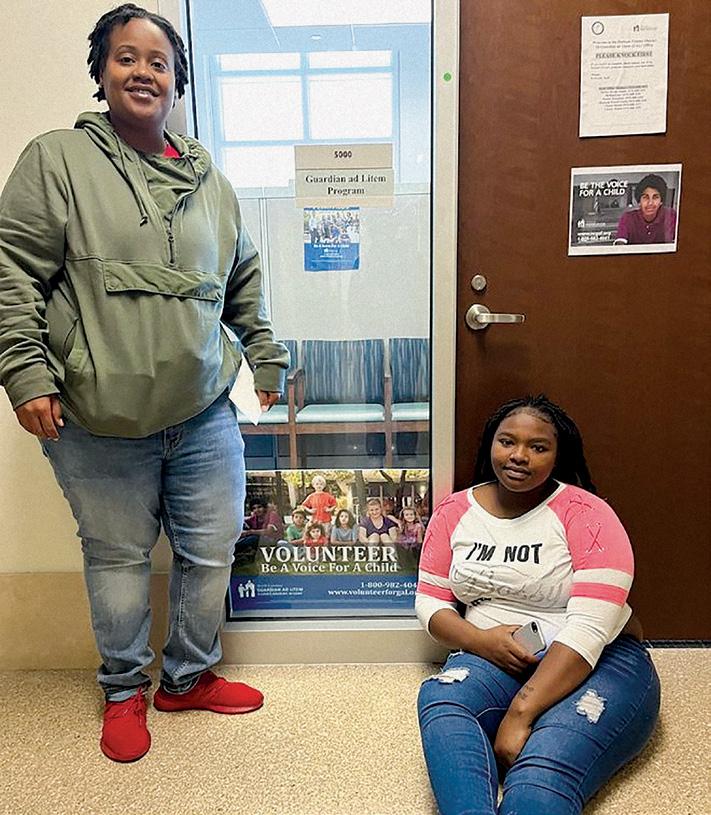The Fate of
















 By Lena Geller, p.4
By Lena Geller, p.4
It’s supposed to help launch small local businesses. Does it?
4 FEATURE: Durham Food Hall was designed to help launch small businesses. After nearly three years and one global pandemic, is that what it's doing? BY LENA GELLER

8 RPD has a new de-escalation policy, but activists are skeptical that it goes far enough to achieve real police reform. BY JASMINE GALLUP
10 Durham's Department of Social Services wants a local mom to stop talking about the children it's taken from her home. BY THOMASI MCDONALD
12 From Shakespeare to RENT, here are the performances hitting Triangle stages this winter. BY BYRON WOODS
14 23 North Carolina hip-hop artists to watch out for in 2023.
BY KYESHA JENNINGS15 Years after starting the musical project, Paul Finn debuts Evening Pines with It will take a long time. BY BRIAN HOWE
16 With a reunion and a reissue, The Kingsbury Manx revisits the perfect naïveté of its classic debut as a seasoned band. BY BRIAN HOWE
BY BRETT VILLENA
In our December 21 paper, the last edition of 2022, Thomasi McDonald compiled a list of Duke University’s 10 most notorious news-making alumni of the past year, whom we dubbed “the hazards of Duke.” Readers had thoughts.
“Typical idiot lib comments with no basis in facts or reality,” wrote reader JOHN MCDUFFIE in an email. “There are plenty of Dookster stooges, but not some of these. To still defend vaccines with the proven facts showing the dangers and deadly results, shows the idiot lib moniker is alive and well.”
We assume McDuffie is referring to our inclusion of Sen. Rand Paul on this list. Twitter commenter @THAGUYFROMSUM41 has a similar take:
“Indyweek cannot STAND watching Rand Paul put Fauci in his place.”
We will say, for the record, that vaccine disinformation is bad. Other readers were not surprised to see who made our list.
“There’s nothing shocking about those individuals being products of that institution,” wrote Facebook commenter CISCO RIVERA
“Been trying to tell people. Read the article,” wrote Twitter commenter CHARLES MILLER
Other readers were genuinely miffed.
“Several of these people did not graduate from Duke, or only went there for post secondary school, but whatever,” wrote reader MIKE LING on Facebook. “You could have been nice and focused on the Dookies who are making positive contributions, but this gets more clicks. Also learn what ‘matriculate’ means.”
Fact check: True. Neo-Nazi Richard Spencer started a PhD at Duke but never completed it. And Kyrie Irving, as we noted, left Duke to play professional basketball and never graduated.
Also, thanks to Twitter commenter MITCH BRYANT for naming 2022 hazard and Trump appointee federal judge Aileen Cannon as being “much more relevant” than Spencer to the 2022 news cycle. Cannon graduated with a BA from Duke in 2003 and ruled in favor of Trump during the investigation into stolen classified documents seized at Mar-a-Lago; we regret this oversight!
We’ll just end by echoing reader Mike Ling’s sentiment: there are certainly many more Duke matriculants making positive contributions to society than there are Stephen Millers or Eric Greitenses or Rand Pauls. We just like to have fun sometimes.
Local news, events and more— in your inbox every weekday morning


WANT TO SEE YOUR NAME IN BOLD? indyweek.com backtalk@indyweek.com @INDYWeekNC @indyweek

The Durham Food Hall was launched in an effort to give small business
owners their start. But are legal and financial troubles, poor upkeep, and an allegedly hostile work environment getting in the way of that vision?
BY LENA GELLER lgeller@indyweek.com“Vendors first,” says Adair Mueller, the owner of the Durham Food Hall, leaning against the oblong bar that anchors the hall’s main dining space. “You have to think about your vendors. Because if they’re not healthy, the hall’s not healthy.”
On this rainy December morning, three days before Christmas, vendors are indeed breathing life into the food hall, which stands at the base of the Liberty Warehouse Apartments complex on Foster Street.
Balls of pizza dough sigh under flour-dusted fists. Oven doors open and shut, burping out buttery wafts of cake. Chicken breasts sizzle on a flattop.
Dripping umbrellas in hand, the lunch crowd trickles in. When the Durham Food Hall—a sizable operation with a slate of chef-driven concepts—was first announced in August 2018, its impending launch was met with broad enthusiasm. News outlets published features and vendor roundups detailing the hall’s emphasis on environmentally friendly practices and local sourcing. Downtown developments marketed it prominently as a soon-to-open walkable destination.
But since last spring, the food hall has worn the kind of gap-toothed smile you notice right away, with several of its vendor stations standing dark and empty.
When the INDY started working to understand why so
many vendors are exiting the food hall, a complicated story emerged. In dozens of conversations, vendors—former and existing—expressed frustration at legal and financial troubles, broken promises, poor upkeep, and a hostile work environment not conducive to running such a massive, multipronged operation, nor one that rewarded the financial risks that vendors had taken.
Of the nine former and existing food hall vendors who spoke with the INDY recently, five say that the operation’s dysfunctionality either drove them from or likely will drive them from the space, once their leases expire, if glaring issues aren’t addressed. Two vendors say their departure stemmed from multiple causes, but that their chances of staying would have been better were they afforded a more transparent, cohesive working relationship with ownership.
Two existing vendors say they are content in the food hall and plan to renew their leases, while two other vendors did not respond to the INDY’s request for comment.
Ownership of a brand like the food hall is more involved than being a landlord but less involved than operating one of the businesses in it. This also prompts questions about the model itself: How much does a business owner owe its tenants? Do food halls, which designate vendors as independent contractors but sometimes limit their input in daily operations, really work for small businesses? And if the food hall is driving vendors away, what does that mean for Durham?
Food halls are status symbols for midsize cities, coaxing foot traffic downtown and helping to nurture and get small businesses off the ground. Raleigh has two: Transfer Co. Food Hall and Morgan Street Food Hall. At their best,

food halls—which originated in Europe and are often implemented as incubator spaces with rotating vendors—afford vendors the opportunity to pilot concepts in a budget-friendly space before committing to a full-size business.
“They’re such a vibrant community space,” says Mueller, a Durham native who first encountered the model while living in New York City during the early 2010s. Upon returning to Durham, Mueller partnered with Michael Olander Jr.—who helms the Raleigh-based firm MDO Holdings and serves as owner and CEO of O2 Fitness Clubs—to launch the food hall, which operates under the legal name Minerva Projects, LLC. (Olander’s firm is also a partner in BB’s Crispy Chicken and Happy + Hale, among other operations; he was not available for comment for this story.)
“All signs pointed to Durham as being ripe for this type of business,” Mueller says.
Following the takeout-only opening of the hall in May 2020, the work of sustaining small businesses intensified, as restaurants took hit after pandemic hit. For vendors, who took risks in signing multiyear leases with Mueller, the pressure to eke out a success story was especially high. And at such a venue, designed as a gathering place, the launch was particularly tricky: much of the seating is communal, and the aesthetic— marked by wide front windows, funky light fixtures, and a sleek industrial finish—places the food hall in a sort of Goldilocks zone for indoor dining, where diners can relax in a space neither too stuffy nor too stark.
While the outbreak of the pandemic put the communal aspect of the hall’s vision on hold, the Durham Farmers’ Market—hosted weekly, even throughout the pandemic, at Durham Central Park, located across the street from the food hall—acted as a lifeline during what would’ve otherwise been a lethal dry spell for the newborn operation and its vendors, with market-goers routinely adding a smashburger or a spicy chicken sandwich to their Saturday morning shopping lists.
After the hall’s transition to indoor dining in April 2021, the habit stuck, with other communities of customers filling in the gaps.
With dine-in service in full swing by summer of 2021, vendors say their concepts proved successful, including three—Lula & Sadie’s, Afters Dessert Bar, and Bowerbird Flowers and Apothecary—who each left the space in May 2022 at the expiration of their two-year leases. The three vendors have opened, or will soon open, permanent locations in Durham’s Lakewood, Brightleaf Square, and University Hill neighborhoods, respectively.
Mueller says her operation is intended to act as a launchpad for businesses and that the departure of these vendors is a testament to the efficacy of the incubator model.
“They would have never been able to do that without the success of the food hall,” Mueller says.
While these vendors do credit the food hall for its role in expediting the launch of their businesses, they also tell
the INDY that they did not simply outgrow the space as Mueller suggests: if things had been different, they say, they almost certainly would have stayed.
Construction on the Durham Food Hall began five years ago, around the same time most of the hall’s original vendors were signing their leases.
From the start, it was a gargantuan task: the 15,000-square-foot space would comprise a split-level dining area with 10 vendor stations, each outfitted with custom equipment that varied by vendor; a central, elliptical bar that the food hall would operate; and an upstairs mezzanine with three private event venues, one of which would host another bar.
Setbacks came early and often. Mueller’s team of architects, engineers, and contractors were experienced in restaurant, but not food hall, design, and Mueller, with a business degree and a sales background, also lacked experience in the hospitality industry. (Mueller says Olander Jr. is involved in "strategic business decisions" and Olander’s firm,
says—she’d been paying rent on the space for two years and the operation had to open in some capacity.
On May 10, 2020, she announced the hall would open for takeout.
For vendors, launching businesses at the start of a global pandemic was not ideal. While Mueller offered to defer a chunk of their rent payments (most rents total between $4,000 and $5,000 each month) and gave them some flexibility in the hours that their leases required, she also only gave them around two weeks’ notice to prepare for the hall’s opening.
Vendors scrambled, with some enacting drastic, takeout-friendly adaptations of their original business models.
Ex-Voto, for instance, a Mexican concept whose menu originally centered around tamales and hand-ground nixtamal tortillas, started serving burritos and crunchwraps.
But after opening for business at the worst possible time, many vendors feel that the food hall’s subsequent delay in opening for dine-in service, the following May, was longer than necessary. In Durham, where local COVID-19 safety precautions were more rigorous than anywhere else in the state, the vast majority of restaurants had reopened for indoor dining by November 2020.
While vendors had the option to defer their rent payments during the hall’s yearlong takeout-only period, the payments still loomed over their heads.
MDO Holdings, provided the following company statement: “We have been investment partners in the Durham Food Hall, but we are taking a deeper look into the day-to-day operations. We are committed to doing whatever is needed to provide the best experience for the vendors and guests.”)
Vendors signed onto the project in spring of 2018 and were told the project would finish construction by December 2018. The project hit a few early roadblocks: the Liberty Warehouse building didn’t have enough amperage to meet the food hall’s utility needs, for instance, so Duke Energy had to install new power units and lines. Delays aren’t uncommon in the food world, and vendors say they were excited about the project and were understanding of the adjusted timeline.
“I never really wanted a big, 5,000-square-foot brickand-mortar, and I definitely didn’t want to go the food truck route,” says Stephen Kennedy, who owns Afters Dessert Bar with his wife Lindsey. “The food hall was much more along the lines of what we were looking for—a small, casual little space to work with and get to know people in the community.”
Construction finally wrapped up in January 2020 and an opening date looked promising. Two months later, COVID19 brought on the shutdown.
At the onset of the pandemic, Mueller put a brief pause on the hall’s launch, but by May, she had no choice, she
The period was especially taxing for vendors who relied chiefly on foot traffic, like Bowerbird Flowers and Apothecary, a vendor that sold bouquets, trinkets, and tonics in the upper level of the main hall.
“When you’re coordinating this many different vendors, it can be hard to know what to do,” says Bowerbird owner Diane Joyal. “But I really wish that indoor dining could have started sooner.”
And between 2018 and 2021, while vendors were bending over backwards to earn a living while adapting to the delays, two things happened.
According to court records, Gateway Building Company—the construction company that Minerva Projects, LLC, contracted to build out the food hall—fully halted its work for a total of more than three months during 2019 and 2020.
The stoppages came after Minerva repeatedly failed to pay the company for its work, Gateway alleges, and neglected to take actions necessary for Gateway to complete its work, such as procuring a gas meter.
On July 30, 2019, Gateway filed a lien—a legal claim against property that can be used as collateral to repay a debt—against Minerva and its landlord, DPR Liberty Warehouse, LLC, in the amount of $97,042; the lien was canceled two months later, when Minerva paid up. In early 2020, Minerva again failed to pay Gateway, the company alleges, and Gateway halted work.
“All signs pointed to Durham as being ripe for this type of business.”
In response, according to court documents, Mueller assured the company’s president “that Gateway would be paid in full for all work performed on the project” and “told him to stop speaking with his attorneys and to finish the project.”
Gateway resumed work on the food hall, but after the project was completed the company remained unpaid, Gateway alleges. In May 2020, Gateway filed another lien against the food hall, this time for $247,476. Months passed. At the end of the summer, Gateway filed a lawsuit to foreclose the lien. After the second lien was eventually paid off, the construction company voluntarily dismissed the suit.
Vendors say they were in the dark about the financial issues driving the construction delays and several say that, had they had a better sense of the situation, they may have tried to negotiate out of their lease agreements before the food hall opened.
Over email, Mueller wrote that Gateway had tripled its budget for the project and she was not “provided substantial receipts or reasoning as to why.” As for keeping vendors looped into the process, she says she shared as much information as she could “while navigating a legal dispute involving multiple private entities.”
Alongside the financial setbacks, vendors also were unaware of the financial assistance that the food hall received.
According to public records, the Durham Food Hall received approval for a federal Restaurant Revitalization Fund (RRF) grant worth $531,239 on May 17, 2021. RRF grants, unlike loans, do not have to be paid back and were awarded as a way to help business owners keep their doors open.
(For businesses that opened after 2019 and thus could not prove losses using revenue data from the previous year, like the Durham Food Hall, RRF grants were calculated by taking a business’s eligible expenses—including items like rent payments and payroll costs—and subtracting gross receipts since opening.)
Mueller is cagey in response to the INDY’s questions about the $530,000 grant, but says she would “just prefer to say that we got pandemic funding, only because that money literally went in and out,” and that it was entirely used to pay rent owed to Liberty Warehouse. Both Mueller and her landlord declined to disclose how much Durham Food Hall pays in rent each month, but Mueller wrote in an email the food hall "has over $70k in monthly fixed costs before we even turn the lights on."
While some vendors received small amounts of pandemic relief funding that they applied for themselves, they say they didn’t receive any of the RRF grant money disbursed to the food hall, nor did they know until much later that Mueller received it. Still, in June 2021, just two weeks after records show the food hall received approval for an RRF
grant worth $531,239, and roughly two months after the food hall started its first phases of indoor dining, Mueller terminated the vendors’ “rent deferral” period. Over the next nine months, vendors paid Mueller back in full.
While a business paying off deferred rent using a pandemic relief grant but still demanding deferred rent payments from its debtors isn’t illegal, it’s still questionable, according to Davey Orts, a Durham-based accountant with experience in restaurant management.
“I would be upset if I was one of the vendors,” Orts says.
The majority of vendors who spoke with the INDY were not aware that the food hall had received a sizable RRF grant—nor were they aware of the hall’s legal issues with Gateway—until the INDY informed them during the course of its reporting. Most vendors found the news to be dismaying but not surprising; they’ve grown accustomed to a lack of transparency from ownership, they say.
“We were not aware of the work stoppages,” says Lindsey Kennedy, co-owner of Afters Dessert Bar. “Obviously, if we
dishwasher, its usage is strictly limited to customer-facing dishes like plates and silverware, and the machine is cumulatively only accessible to vendors for a few hours during the day.
Mueller says it is a “continued challenge to satisfy the varying opinions” of the vendors but that she has been open to vendors’ feedback.
Other areas of contention include the lack of space allotted to vendors, particularly in the walk-in refrigerator and freezer, and poor accessibility to the upstairs events spaces, where there is no service elevator for event planners and renters to use.
“It speaks to this pattern of perpetuating the Durham Food Hall as being a part of the community, but yet, you’re not providing access to everybody in the community,” says Lindsey Kennedy.
About six months after the food hall opened, vendors say, it became clear Mueller had not given vendors an accurate estimate of how much they would have to pay for communal cleaning staff. Vendors say they were forced to pick up the slack. (During the first six months of service, most of the cleaning was handled by the hall and beverage directors, according to vendors.)
“[Mueller] had planned initially on paying them like $10 or $12 an hour,” Stephen Kennedy says. “And when she found out that wasn’t going to work, she just passed that cost on to us. A lot of that type of thing happened—these extra costs just kept building up.”
Monthly operating costs for communal supplies and cleaning staff now total around $1,000 per vendor. Vendors say they are frustrated that those costs keep rising and that receipts aren't itemized, so they don't know how the money is being used.
had known about that, it would have given us a clue into the management style—a preview of the troubles that we would face later on.”
While Mueller was working behind the scenes to keep the food hall afloat financially, vendors say she struggled—and continues to struggle—to manage dayto-day operations.
“Between all of the vendors, we’re talking about at least a couple of centuries' worth of restaurant experience,” says Harry Monds, who owns Lula & Sadie’s. “Our advice was rarely paid any attention, even from the very beginning in the design of the space. It became a tenuous situation.”
Many vendors say they feel Mueller and her design team structured the space without considering the needs of tenants. The main dishwashing area, for instance, comprises just two midsize four-compartment sinks.
“It becomes a real problem,” Monds says. “There’s nowhere near enough space for the dishes to get washed.”
And while the food hall has an industrial, high-power
Despite dishing out extra funds, many vendors say they have found the hall’s day-to-day upkeep consistently poor, particularly since spring of 2021, when the hall opened for dine-in service.
While staff shortages have certainly plagued the restaurant industry in recent years, former food hall employees say there’s a larger issue at play: Mueller enforces a strict separation between the responsibilities of cleaning staff, whom vendors pay, and bar staff, whom the food hall employs directly.
Mueller doesn’t refute this; “that’s exactly the delineation,” she says. But former hall employees and vendors say Mueller’s preoccupation with creating this division of work—a preoccupation, they say, with who is paying for what—has created a backwards system where bartenders are forbidden from assisting understaffed clean teams, and clean teams are barred from helping out overwhelmed bartenders.
This preoccupation is so extreme that Mueller has monitored the food hall using security cameras and scolds workers when they deviate from their assigned tasks, former employees say.
“Between all of the vendors, we're talking about at least a couple centuries' worth of restaurant experience. Our advice was rarely paid any attention.”
“A bartender or a bar manager would go out and try to help get things clean,” Monds says. “And they were called, or texted, and told, ‘Stop doing what you’re doing.’ It’s a little unsettling when you’ve got somebody that’s constantly watching you.”
Mueller denies surveilling employees, outside of one instance with “a new employee.”
Former hall employees aren’t the only ones looking over their shoulders.
At the time they signed their contracts, vendors say they were told they could have some flexibility in their hours, and that their hours were open to negotiation. But when they tried to negotiate or diverge from those hours, multiple vendors say they received legal threats.
Monds, who operated Lula & Sadie’s for more hours than any other vendor during his two years at the food hall—for the first chunk of the pandemic, he was even open on Mondays and Tuesdays, when the food hall’s own bar was closed—says he received numerous legal threats from Mueller at times that he deviated from the hours in his lease.
“Verbally, I was told that, you know, this wouldn’t be a problem,” Monds says. “But then I started getting threatened with ‘default, default, default,’ because I wasn’t adhering to the letter of our operating hours,” he says.
When this started happening, Monds decided that he would only correspond with Mueller in writing; ultimately, the relationship became so frayed that Monds insisted on communicating with Mueller only through his attorney, he says.
Over email, Mueller wrote that the hours of operation
have been an ongoing issue at the food hall, as the hours of one vendor can greatly impact the rest, and denies making any legal threats to vendors.
Months after the exits of Afters Dessert Bar, Lula & Sadie’s, and Bowerbird, the food hall is finally working its way back up to capacity.
In July, novice vendor Little Barb’s Bakery opened in the space formerly occupied by Afters.
In coming weeks, Mango, a branch of the Chapel Hill Indian restaurant CholaNad, will open in the former Lula & Sadie’s spot, and MILKLAB, a Triangle-based bubble tea shop chain, will launch where Bowerbird once stood.

The three former vendors, whose operations are now taking shape in new spaces, describe their food hall departures as upsetting, particularly after forging friendships with fellow vendors and employees, outfitting their stations with expensive equipment, and marketing themselves under the food hall brand.
“I did want to stay,” Stephen Kennedy says. “And if a second location came by organically, that’d be great. It was never my intent to leave—I saw it as a place that we would be for a while.”
“If we had a good relationship [with ownership], we probably still would have gone out to another building, but we would have stayed in the food hall to have a presence downtown,” Monds says.
“I really wish I could have stayed in the food hall, in some ways, but the rent was just too high,” Joyal says.
Another vendor, Old North Meats and Provisions, left the food hall last month; its successor has yet to be announced.
Old North Meats owner Joel Schroeter declined to com-
ment on the role that specific operational issues played—or did not play—in his departure, but he noted that while his business proved to be profitable, he and his business partner still took steps that allowed them to cut their original lease in half.
“We wouldn’t have felt the need to spend the money on lawyers to reduce our lease, when we had very little money in the bank—we wouldn’t have done that if we had felt supported and kind of, you know, confident in the situations,” Schroeter says.
Eric Montagne, on the other hand, still has a few years on his lease for Locals Seafood, and says he doesn’t see any reason why he wouldn’t renew it.
“There’s issues everywhere,” Montagne says. “We opened in one of the most stressful periods in modern history. And so I kind of take things with a grain of salt. I’ve really enjoyed pushing on past that.”
While other vendors agree that the operation is running more smoothly than it once was, several say that things have only improved because Mueller no longer has day-to-day contact with vendors and that some of the issues detailed by former vendors and former employees are ongoing.
Vendors who spoke with the INDY emphasize that the food hall is a fantastic concept—one that truly belongs in the heart of Durham—but feel it needs nurturing in order for existing and future vendors to thrive.
Otherwise, they fear the operation may become a black eye to the city; an incubator space with the opposite of its intended effect, driving bright-eyed novices with creative concepts to leave the industry entirely. W
The Raleigh police department’s new de-escalation policy is a step towards reform, but activists says it doesn’t yet go far enough.
 BY JASMINE GALLUP jgallup@indyweek.com
BY JASMINE GALLUP jgallup@indyweek.com
Last year, Raleigh police shot and killed two people in what many advocates argue were preventable incidents. This year, the department has introduced a de-escalation policy designed to prevent deadly confrontations between officers and civilians.
The RPD’s new de-escalation policy took effect late last year after the department hosted a series of “listening sessions” to get input from criminal justice advocates and the public, a process the city’s Black communities continually pushed for following the shootings.
Last year, in January police shot Daniel Turcios, 43, five times in front of his wife and two children. Body camera footage revealed Turcios, who didn’t speak English and couldn’t understand officers’ commands, was trying to walk away from police when he was first tasered in the back.
Then, in May, 37-year-old Reuel Rodriguez-Nunez was killed after police opened fire with more than 30 rounds fol-
lowing a confrontation outside a southeast Raleigh police station where Rodriguez-Nunez was throwing Molotov cocktails at police cars.
Body camera footage revealed that although several of the police officers surrounding Rodriguez-Nunez were trying to de-escalate the situation, ordering the man to stop and take his hands out of his pockets, one officer goaded Rodriguez-Nunez into continuing his attack just before police opened fire. Statements from Rodriguez-Nunez during the incident and from family members afterwards suggested he was in crisis and was attempting suicide by cop.
These shootings are part of a larger pattern of use of force by Raleigh police, advocates argue. Kerwin Pittman, a policy and program manager with Emancipate NC, says he wants to see the RPD’s attitude shift from a “warrior mentality” to a “guardian mentality.”
“De-escalation can’t be true de-escalation if you’re approaching the scene as if somebody is combative and you actually have to eliminate the threat. You have to approach it from a public health standpoint,” he says.
“Once you adopt that mentality, then you can roll into what actual de-escalation looks like. It’s taking time … slowing down the situation, but also, most importantly, de-escalating themselves. [Officers] have to take their feelings outside of this and lean into their training.”
De-escalation and how best to achieve it has become a popular talking point over the last few years as advocates push for police reform. Essentially, it means that instead of going straight for their taser or gun, police officers will first try to talk to people or communicate nonverbally. They may keep their distance, preventing a need to react to threats. They’ll do what they can to eliminate the need to use force.
RPD’s de-escalation policy follows this pattern, requiring officers to “assess the level of non-compliance and determine whether there is an immediate need to act.” A need to respond immediately, without attempting de-escalation, could be brought on by an “imminent threat of safety to the officer or others,” destruction of evidence, or a medical emergency, among other factors.
The policy also directly addresses scenarios like the ones in which police shot and killed Turcios and Rodriguez-Nunez. Per the policy, officers should consider
whether a lack of compliance is “a deliberate attempt to resist or is the result of an inability to comply,” perhaps due to a language barrier or other factors (including physical limitations, developmental disabilities, or mental health crisis).
In addition, “an officer should not antagonize or bait a subject to act in a manner that will reasonably result in an unwarranted escalation,” the policy states.

The RPD’s new de-escalation policy is a step toward police reform, but some say it doesn’t go far enough. The final policy lacks specific detail and is open to misinterpretation by officers, argues Pittman. He is concerned officers still won’t be held accountable for their use of force, even with the new policy in place.
“When a policy lacks specifics about how you are supposed to operate, it leaves room for a lot of error. It leaves it up to the officers’ interpretation … and we know when they lean on their own interpretation, as we’ve seen in the past, they make mistakes,” Pittman says. “With de-escalation, you have to get it right. One time getting it wrong could cost somebody their life. The devil is in the details. If you have something that’s not descriptive, it’s a recipe for disaster.”

In an open letter sent in November, Emancipate NC requested nine changes to the draft policy based on the strong de-escalation policy that the Seattle Police Department uses, which is modeled on a policy from the Oregon State University Department of Public Safety. One request was that the RPD include “specific, descriptive, and step-by-step instructions for officer communication in a de-escalation scenario.”
For example, an officer could be instructed to “acknowledge the individual’s feeling” or cautioned that “warnings given as a threat of force are not considered part of de-escalation.”
Emancipate also asked that the RPD “emphasize that the use of force should be a last resort” and “set stronger expectations for how officers must attempt de-escalation.”
“Establishing de-escalation as a priority only ‘when time and circumstances reasonably permit’ is too vague and lends itself to willful misinterpretation,” the letter states.
The RPD didn’t respond to Emancipate NC’s proposed changes to the de-escalation policy, according to Pittman. He says he’s disheartened by the department’s lack of response to community input.
“If you’re going to come to the community and ask for input, but not take it into real consideration, then what was the point?” Pittman says.
The department has indirectly addressed some of the nonprofit’s concerns, specifically regarding de-escalation training and the ability of the department to ensure its officers are using de-escalation techniques.
Annual de-escalation training is required for all employees, per the new policy. That training will include specific examples of de-escalation techniques, based on the curriculum of the North Carolina Justice Academy—a training facility run by the NC Department of Justice under the oversight of Attorney General Josh Stein—according to Goodwin.
The policy also includes a provision that supervisors should assess ongoing de-escalation attempts and monitor employees’ use of de-escalation techniques. That provides an additional level of accountability for officers, according to RPD Captain Eric Goodwin.
This provision includes some caveats, however, like the fact that supervisors will assess ongoing field conflicts “when present” (which they sometimes aren’t) and refer an employee to more training if they’re found deficient during a use-of-force review, which is given after a use-of-force incident has already taken place.
RPD officials will review the policy annually so changes and amendments can be made. Pittman says he’s hopeful that the policy can be improved in the coming months or years.
“[The RPD] has said they’re open to revisions, and we’ll continue putting pressure on them to revise the de-escalation policy so they can get it right.” W
“When a policy lacks specifics about how you are supposed to operate, it leaves room for a lot of error. It leaves it up to the officers’ interpretation. And we know when they lean on their own interpretation ... they make mistakes.”
A Durham mother fights to be reunited with her children. DSS wants her to shut up about it.
BY THOMASI MCDONALD tmcdonald@indyweek.comKelli Smith of Durham says she was originally going to spend a holiday on December 22 at home with her toddler children who have been in foster care for a little over three years. She looked forward to opening gifts, making them comfortable, and cooking her babies—now three and two years old—something to eat.
“Child Protective Services [CPS] always puts stumbling blocks in the way,” Smith told the INDY this week. “They put me on the spot, and told me, ‘You can have [the visit] at the DSS building, or you don’t have it at all.”
The DSS decision for her to spend two hours with her children in a room at the agency’s building saddened her.
“It just reminded me of what me and my children are going through,” Smith says. “Christmas is about family and opening gifts. My daughter kept asking me, ‘Mommy, when are we coming home. How long will it take?’”
The court, on December 15, did not consider Smith’s request to have her children at her home on Christmas Eve and Christmas Day. Instead, Durham County district court judge Doretta Walker upheld the continuance of a no-contact order that made no mention of Smith’s ability or inability to take care of her children.
The no-contact order appeared to penalize Smith for publicly advocating for the legal and physical custody of her children and for joining protests that challenged the policies of the Durham County Department of Social Services (DSS), particularly the agency’s child protective services unit. Without an attorney, Smith has relied on the support of the controversial group Operation Stop Child Protective Services and its fiery founder, Amanda Wallace, in
her more-than-three-year-long quest to bring her two children home.

The INDY first reported on Wallace and her unique brand of advocacy on behalf of mothers who have lost custody of their children to DSS last summer, nearly a year after she started a one-woman crusade that has become an acute pain in the ass for DSS officials. This summer, Durham district court judge James Hill upheld a no-contact order against Wallace and Operation CPS, of which Smith is a member, that barred Wallace and the group from protesting outside of the DSS offices and the county courthouse.
But the issue of CPS, and foster care, with its disproportionate impact on Black families, became part of the national conversation late last year after CBS Sunday Morning aired a segment titled “When the System Fails, Families May Pay the Ultimate Price.”
One featured guest on the program was Dorothy Roberts, a sociologist and University of Pennsylvania professor. Roberts is the author of Torn Apart: How the Child Welfare System Destroys Black Families— and How Abolition Can Build a Safer World and Shattered Bonds: The Color of Child Welfare, and her commentary mirrored many of the concerns raised by Wallace and endured by Smith.
Roberts, while emphasizing how poor Black families are disproportionately impacted by the child welfare system, describes terms like “child welfare,” “foster care,” and “protective services” as propaganda. She prefers the term “family policing system.”
“Because that really describes what the system does,” Roberts says in the segment. “To investigate, to accuse, to tear apart.
More than half of Black children in America will be subjected to a child welfare investigation before they reach [age] 18.”
The nonprofit Movement for Family Power (MFP), in a letter last month to Judge Walker, stated that Smith and Wallace are contesting a system that disproportionately impacts economically challenged Black families.
Black children “are not primarily involved in the child welfare system because their parents are abusive,” the MFP letter states.
“Far more common than a child who comes into care because they experienced physical abuse are children who come into foster care because the food stamps ran out or because an illness went untreated after parents were kicked off Medicaid or because a single mother trying to stay off welfare could not provide adequate supervision while she worked. Even where harm does exist, the North Carolina system has
not been shown to prevent abuse,” the letter continues.
Smith says she was a teen mom and having a difficult relationship with her mother, when, in 2019, DSS took her first child from her. One day while the two argued, Smith says her mom called DSS and claimed she was abusing and neglecting her infant daughter.
“My mom ended up telling DSS the things she said [weren’t] true and she said them because she was upset with me,” Smith says.
Smith says she was later taken into a room at the county courthouse and her court-appointed lawyer asked her to sign papers that dismissed the abuse and neglect allegations.
“I thought I was signing something that said the things I did to my child [weren’t] true, and DSS knows [they weren’t] true,” Smith says. Instead, she later learned that
she had signed a document admitting to the allegations.
“I was taken into a room and signed papers without a guardian ad litem present,” Smith says. “My mom was there, but she wasn’t allowed in the room.”
Smith later saw the allegations in a court order that removed her baby from her home.
“These are all lies,” she remembers thinking about the allegations.
In 2021, DSS officials returned to Smith’s home and removed her six-monthold son from the home.
Last month, MFP wrote a second letter to Judge Walker prior to the December 15 court order to silence Smith and Wallace.
“We have deep concerns about the precedent this court would be setting by restraining the actions of Kelli Smith—a Black mother, exercising her First Amendment right by raising awareness for the forced separation of her two children,” MFP members stated.
During the summer, Smith had taken her cause before the Durham County Board of Commissioners during a regularly scheduled meeting. Teary-eyed and nearly overcome with emotion, the young mom could barely speak.
“I’ve done everything that CPS has asked me to do,” Smith told the commissioners. “And my children still haven’t been placed back with me in my home. CPS closed the case on one of my children. They basically said it’s OK for me to be a great mother for one of my children but not the other two.”
On June 7, Smith received a letter from DSS that named all three of her children before informing her that there was no indication of maltreatment of her youngest son.
In August, Wallace told the INDY that she thinks CPS “is trying to adopt [Smith’s] other children out.”
On October 12, Smith filed a motion for review with the Durham County Juvenile Court. She stated that she had “substantially complied” with the conditions the court had “previously ordered” and that it was “in the children’s best interests to return to her legal and physical custody”— at the very least “as a trial placement.”
With the holidays approaching, Smith asked the court if she could have an “overnight visit” with her babies, beginning on Christmas Eve and ending the day after Christmas, according to her motion for review.
A hearing to consider Smith’s motion was set for December 15.
But things went left during the hearing when Glenna Boston, the case’s guardian ad litem attorney, filed an order that
asked Judge Walker to continue to include Smith in the temporary restraining order against Wallace and Operation CPS issued by Hill in late August.
Smith’s hope for a “trial placement” of her children at her home was not considered. Instead, Walker signed a temporary restraining order that prohibited her right to publicly speak or protest her case.
“The restraining order,” Boston stated, “will not harm” Smith.
“Judge Walker stated that if you informed anyone of the confidential information that we discussed in the courtroom, your holiday visit would be dismissed,” Smith’s guardian ad litem, Shelley Brown, who Walker appointed to represent Smith at the December 15 hearing, wrote in an email to Smith shortly after the hearing. “Due to the agency and the guardian ad litem office [having] been notified that information from the hearing has been discussed, your holiday visit has been cancelled.”
In her four-page request to continue the no-contact order, Boston stated that Smith had chosen to rely “heavily on the advice” of Wallace and Operation Stop CPS.
Boston also stated that she and her family were threatened and harassed due to her representation of Smith’s children in the case. She also claimed that on October 18, Smith and Operation Stop CPS had “phoned her repeatedly without ceasing” and had camped outside of her office and did not leave until they were “forcibly removed by a sheriff’s deputy.”
Boston added that she was targeted with emails and texts “with negative and racial undertones as implicit threats” toward her, and that Smith in concert with Operation Stop CPS had posted on social media personal information about her “with the goal of harassing” her.
Boston also criticized Smith and Operation Stop CPS for posting videos and photos of the young mother’s children on social media sites, in which Smith is talking to them about going home and “sharing personal moments of the minor children.”
Boston, in addition to stating that she is afraid for the lives and livelihoods of herself and her family, noted that “a child’s right to privacy outweighs” Smith’s rights as their mother “and her agents to free speech in this matter.”
But MFP officials accused Boston of using Smith’s case “as a venue to seek a protective order for her own personal interest and the interest of her family.”
“The basis of Ms. Boston’s motion relies heavily on communication that Ms. Bos-

ton interprets as offensive,” the MFP letter states. “Speech cannot be restricted merely because a speaker’s message is offensive to the government or to the recipient.”
Prior to the December 15 no-contact order, Smith, who has an eight-monthold son at home, was allowed a two-hour Thanksgiving visit supervised by the children’s grandmother on the fifth floor of the DSS offices. The visit took place several days before Thanksgiving, “before they closed for the holidays,” Wallace says.
After Walker signed a continuance of the no-contact order, Wallace says DSS officials at first canceled altogether a Christmas visit with Smith and her children. But on December 20, Brown sent Smith an email informing her that she could have a supervised, two-hour holiday visit with her children on the second floor of the DSS building the next day. That’s a far cry from spending Christmas Eve and Christmas Day in their mother’s home.
“I want you to focus on the bigger picture...seeing your kids, giving them Christmas and creating yet another positive memory of them with you,” Brown wrote.
DSS officials could not be reached for comment about Smith’s case.
Meanwhile, MFP describes Smith as trying to keep her head up and her faith strong. She works each day with People Ready, an agency that supplies temporary workers for local businesses. She attends therapy sessions, is considered a leader in her Hoover Road community, and looks after her eight-month-old son.
“Ms. Smith is a resilient mother who has overcome every obstacle this system has placed in her way,” the MFP letter concludes. It urges the court “to allow free expression against racial discrimination.”
Smith says she did not become aware of the confidentiality violation until the December 15 hearing.
“They want me to feel ashamed, but I’m not ashamed,” she adds. “They took advantage of me because I was a teen.”
Smith says she wants to let other young mothers know the perils of what could happen to their children if they become ensnared in the child welfare system, and she says the best outcome is for her children to come home.
“I want my children to come home and live with me and my other son,” she says. “My daughter asks why do I take my youngest son after a visit, but leave them? I tell her I can’t do anything about that right now. I want them to come home, and heal from this trauma we have experienced in our lives.” W
From Shakespeare to RENT, here are the must-see performances hitting Triangle stages this winter.
BY BYRON WOODS arts@indyweek.comPerhaps it’s just a trick of the senses, but doesn’t the cold make the stars look sharper? Orion, Taurus, Canis Major, and the Quadrantids—the yearly meteor shower whose late-night pyrotechnics hit their peak this week—somehow all seem brighter in the chill of a winter’s sky.
The extended nights of the hibernal season are also auspicious for a different sort of stargazing: in the region’s theaters. There, constellations of stage artists will enact epic stories through the winter months, unfolding nightly, like the ancient sidereal ones overhead. Here are a few we’ll be tracking.
1990s. But given her recent triumphs in film and on stage, buzz has been circulating for months about actor Tia James’s upcoming take on the Dane in Vivienne Benesch’s January production at PlayMakers.
Justice also figures in Andalusian poet and playwright Federico García Lorca’s rarely staged Blood Wedding. This Spanish folk drama is steeped in Duende: the deadly passion sung of by the cantaores, in which the deepest love demands the deepest risk. Celebrated veteran director Rachel Klem returns to probe the lyrical beauty and treacheries that lace a multigenerational tale of love in a culture where honor demands a debt of blood.
PlayMakers Rep | Jan. 25 – Feb. 12 | Playmakersrep.org
Sweet Tea Shakespeare | William Peace University | Jan. 25-26 | Sweetteashakespeare.com
Every few years, someone takes on the old theatrical dare: take the number of folks you’d need for a good basketball game and stage a Shakespeare play with them. A cast of five astonished audiences when the Chapel Hill–based Actors from the London Stage performed Romeo & Juliet and Twelfth Night in the ’90s before Burning Coal attempted its (Three Man) Tempest in 2013. Sweet Tea Shakespeare splits the difference in its latest installment of the Henriad cycle, in a one-week run with a talented quartet including Dustin Britt, Jed Dixon, Teal Lepley, and Laura Parker as the monarch. Mia Self directs.
The region has seen a female Hamlet before—an august Mary Rowland made a memorable turn as the brooding prince in an independent Raleigh production in the
Hong Kong Ballet | Carolina Performing Arts | Memorial Hall, UNC | Jan. 20-21 | Carolinaperformingarts.org

Burning Coal Theater | Jan 26-Feb. 12 | Burningcoal.org
Raleigh Little Theatre | Jan. 27–Feb. 12 | Raleighlittletheatre.org
The theatrical challenge: stage a work whose central character is an adult African elephant—16 feet tall, just under 400 pounds—and its ghost, as it follows its tusks, which it was killed for, across a continent and beyond. Adventurous director Ana Radulescu, no stranger to the avant-garde, takes on Pulitzer Prize winner Lynn Nottage’s drama Mlima’s Tale, as a spectral pachyderm walks in search of justice among denizens of the illegal ivory trade, from poachers and police to bureaucrats, businessmen, artisans, and finally you, the consumer.
Those familiar underpinnings of love, misguided family honor, and blood also play out as choreographer Septime Webre plunges Romeo and Juliet into the cultural conflicts of Hong Kong in the 1960s. Warring families square off in expertly choreographed kung fu street fights to the famous Prokofiev soundtrack, when Carolina Performing Arts presents them at Memorial Hall.
uary. Choreographer Moses Pendleton broke away from the modern dance institution of Pilobolus in 1980 to pursue his own muse in longer-form, evening-length works including a suite based on the Peter Gabriel soundtrack to the film Passion. In Alice, he takes his trademark multimedia mélange of surreal acrobatics, unconventional dance, and trippy costumery, props, and film down the rabbit hole in a work inspired by Lewis Carroll—and a certain song by Jefferson Airplane.
The following week, a subversive group of patrons pursuing a different aesthetic agenda hijack and upgrade a monotonous monochrome minimalist exhibition in Quebec-based Machine de Cirque’s La Galerie, transforming the space and the night into a celebration of color, life, and kinetic art.
Momix | Jan. 22 | Duke Performances | Page Auditorium | Dukeperformances.duke.edu

Jan. 31 | Duke Performances | Page Auditorium | Dukeperformances.duke.edu
Spectacle is key as Duke Performances brings two imaginative dance troublemakers to Page Auditorium in late Jan-
Honest Pint Theatre | Studio Theatre, Theatre Raleigh | Jan. 21–Feb. 4 | Honestpinttheatre.org
“Without a common logic, it’s every man for himself and fuck your neighbor as you would expect your neighbor to fuck unto you.” Honest Pint Theatre first turned on the taps in 2013 with this gritty, probing police procedural, which our INDY Week five-star review called “a

dirty, unsafe urban roller coaster” of a show. Ryan Brock and company cofounder David Henderson return as Denny and Joey, lifelong friends and veteran Chicago cops, who are being grilled by Internal Affairs after a blown call in the field leaves blood on the ground and a potential victim in the hands of a serial killer. As the jagged rhythms of playwright Keith Huff’s muscular prose trace out differing versions of what happened, the moral compasses of two deeply flawed centurions leave us asking who the bad guys are, and what exactly is the law once you get it on the street?
by one, on an originally empty stage in the early parts of Geoff Sobelle’s Home But the real magic takes place afterward. A group of performers combine theater and dance to probe the interiority of the everyday lives of those who live in the house: family members who have to share the single bathroom, kitchen, and dining room before seeking sleep at night. But as the house ages and families move in and out, Sobelle meditates on the notion of living space: the comfort, support, nurturing, and protection of the spaces that let us live, and the ways in which family and friends finally turn the rooms here into a home.
Since interfaith initiatives are rare on the regional stage, it got our attention to learn that a Jewish cultural center, a Baptist church, and an independent Raleighbased troupe best known for children’s theater were teaming up for a production of My Name Is Asher Lev. Chaim Potok’s best-selling 1973 novel follows the childhood and life of the title character in a Hasidic Jewish family in New York in the 1950s. His artistic abilities, and his growing awareness of the stressors that faith and relationships place on the members of his family, ultimately invoke ageless conflicts between religion, art, tradition, individualism, and identity.
Count on DPAC to bring on the Broadway bus-and-truckers, with five shows over the next two months. After Tina: The Tina Turner Musical plays January 3-8, we’ll see the 9/11 drama Come from Away (Jan. 18-22), Andrew Lloyd Webber’s evergreen Cats (Jan. 31–Feb. 5), and The Book of Mormon (Feb. 14-19) before Riverdance (Feb. 24-26) and the Alanis Morissette songbook musical Jagged Little Pill (Feb. 28–Mar. 5).



Through artful illusions and wizardly set design and stagecraft, the rooms of a two-story house suddenly appear, one


Elsewhere among the indies, North Carolina Theatre revives the musical Dreamgirls at Raleigh Memorial Auditorium (Feb. 7-12), Justice Theater Project stages The Best of Enemies (Feb. 10-26), and Switchyard Theatre takes Noel Coward out for a spin in Present Laughter at Durham’s PSI Theatre (Feb. 23–Mar. 5). On the student circuit, UNC’s Pauper Players pays RENT (Jan. 20-22), before Meredith College makes a splash with Carrie: The Musical (Feb. 22-26). W

23 North Carolina hip-hop artists to watch out for in 2023.
 BY KYESHA JENNINGS music@indyweek.com
BY KYESHA JENNINGS music@indyweek.com
The soulful songstress hasn’t released an official single in almost two years but somehow has still managed to capture the attention of 13,000+ listeners a month on Spotify. Luckily for fans, they can hear Chlo’s textured voice on TikTok and with 168,000 followers and counting, her fans are patiently waiting for whatever’s next. Hopefully, in 2023, we will get a track as relatable as “See Me.”
Producer/rapper DaVaun’s production and songwriting abilities are impressive. Each song feels made for the radio and his coolkid persona is visible not only in his music but also when performing live. This year DaVaun performed all over the Triangle and even curated his own show, DaVaun & Friends. He ended the year with a bang, performing at Mir.I.am’s Carolina Waves fiveyear anniversary.
2022 was an experimental year for the Durham-based rapper Defacto Thezpian (Raheem Royal). After taking some time off from music, his “comeback” was exceedingly well executed. The trained actor turned rapper took a number of risks, including introducing his Raheem Royal producer persona, opting out of releasing his album on streaming platforms, and pricing his album at $20—a price point that’s a stark shift from the frequent free projects indie artists often release, and on average almost double the price of an album from A-list rappers. But there were perks to the purchase: Defacto provided those who bought the album access to a minidocumentary and podcast, and the album rollout was arguably one of the best in the Triangle area this year. And while it might be a while
before we hear from the talented rapper/ novice producer, we will be looking out to see what new innovative marketing strategies he imagines next.
Consider this: Ol’ Dirty Bastard meets Ludacris with a sprinkle of Lil Wayne. Fif Shang’s creativity and boundary-pushing performances, which often include a number of props, position him as a student of the aforementioned rap legends. His raps are raw yet playful and guaranteed to make you catch a vibe.
5.
Landing at no. 6 on the iTunes rap chart is a hard flex. It’s also not an easy feat without major label support, but George Yamazawa, better known as G Yamazawa, did just that after the release of his self-titled album. The album includes production collaborations with other local talents like Solomon Fox of Young Bull and Alan Thompson of Zoocrü. The best surprise of all on the album is track no. 4, “Make It Knock,” which features Mississippi native Big K.R.I.T. 2022 was a big year for G in other ways, too: In addition to the release of George, the rapper got married and won documentary awards for his work on Becoming Yamazushi. 2023 screams headline performances, a host of dope features, and additional creative endeavors that will maximize all of his talents.
Multi-instrumentalist Imani Pressley is truly a talent to be reckoned with. The Grammy-nominated producer wrote, produced, mixed, and mastered Self., her latest album, which dropped in October. The genre-bending artist has impressed listeners by creating pop, R&B, EDM, dubstep, and trap music.
Born and raised in Gulfport, Mississippi, the Raleigh-based rapper Jaszie (Jazmine Handy) has an unmatched level of grit and hustle. The mother of two gracefully juggles entrepreneurship while working as one of Raleigh’s top hair stylists and as a committed rapper on the rise. Jaszie’s freestyling abilities separate her from other female rappers, and her music follows the tradition of women rappers who celebrate their sexual agency and embrace all things raunchy.
2022 for Jooselord, the infamous Moshpit Messiah, was a year of consistency and high-energy live performances across the state. In July, Joose announced that he’d signed with the Empire Agency, and in September, he performed at Raleigh’s Hopscotch Music Festival as an official artist, headlining at downtown Raleigh’s oldest bar, Slim’s. If you have yet to experience a Jooselord show, we highly recommend you make room to do so in 2023.
9.
Lena Jackson is a beast! The emcee is well versed in storytelling and flexing her lyrical muscle. This year, Jackson shared the stage with hip-hop legends KRS-One and Grand Puba of Brand Nubian. Her singles “MASSA” and “Cup Runneth” are great introductions to her catalog of socially conscious music.
10.
Repping the city of Charlotte, the Dreamville signee can rap his ass off. West spent most of the year making appearances at
a number of major festivals and releasing dope visuals to accompany his singles. With an Instagram curated to perfection and the return of his “Gold Mouf Mondays,” it’s a good idea to keep an eye on the Grammy-nominated rapper in 2023.
11. Northside Rocky | @northsiderocky
In 2020, I wrote that “Durham native Northside Rocky’s unique multi-genre sound allows him to master both singing and rapping. His radio-friendly sing-rap songs all include catchy hooks and immaculate production.” Three years later, this remains true. Rocky’s feel-good music, perfectly curated Instagram, and polished visual content makes him a label’s dream come true.
12. Professor X | @professorxtheproducer
Professor X is a producer from Eastern North Carolina who finds inspiration from a number of musical genres—from house music to jazz to boom-bap hip-hop. He is best known for his soulful and nostalgically textured blends and mixes. This year though, Professor X shined bright as Professor X and the DJ became arguably one of the Triangle’s most talented hip-hop DJs.
13. Pat Junior | @iampatjunior
“Feelings 4 You” by Xavier Omär—a track that Pat Junior and his music partner Justin Pelham contributed production to—landed on President Barack Obama’s “Favorite Music of 2022” list, thus demonstrating Pat Junior’s range: In addition to his own music-making abilities, the Raleigh artist is a talented writer and producer. The consistency he has maintained is paying off with
37,000+ monthly listeners on Spotify and an engaging fan base on Twitter.
14.
Is it possible to have a bad year when you are a hip-hop prodigy? Reuben Vincent is a rapper’s rapper: His skills as an emcee are rooted in the foundation of hip-hop and, at 22, the Jamal/Roc Nation signee has accomplished more than many of his peers twice his age, all while excelling in college.
Based on all that he accomplished in 2022, Shame Gang is arguably one of the hardest-working rappers in North Carolina. Just this year, he opened for Benny the Butcher and hip-hop legends Outlawz and KRS-One. He also performed at Raleigh’s Hopscotch Music Festival as an official artist, appeared on NPR’s Live Sessions, was featured on Amazon Music, and dropped two super-dope videos.
In 2019, Jordan Williams—professionally known as Sonny Miles—was featured on Obama’s “Favorite Music of 2019” playlist— and his career has been on the rise ever since, with his soulful vocals proving to be a sought-out feature. He brought in the year strong as the headliner for First Night Raleigh 2022; in 2023, he rang in the new year with a performance at CAM Raleigh.
Representing Jamla records, Swank and King Draft have been hard at work this year. The trajectory of their career shows that mainstream success doesn’t depend on talent alone but comes with dedication, hard work, and patience. And the lyrical efforts of these two emcees just work: They’re able to play off of each other’s diverse flow and wordplay while offering deliveries that are distinct. This year, fans were able to see them shine on 9th Wonder’s ZION VII
Raleigh-based artist Tanajah has spent most of 2022 touring across Denmark and performing at three major international festivals: Fresh! Aarhus Festival, Volume Village Beta Festival, and Gemini Festival. In October she was featured on Barcelona-based duo Wild Bounce’s latest single “Good Time,” a feel-good track that merges a wide range of genres. 2023 is looking good for Raleigh’s international rap superstar.
You know you’re winning when your single has been named one of the best songs of
the year by Pitchfork. The Winston-Salem native has another hit with “FreakyT,” and her rap career has been on the rise since she went viral in 2020. Two years later her music continues to serve as the perfect sonic backdrop for a number of TikTok users. The eclectic rapper also still manages to wow fans with creative looks, whether she is dressed up like Halle Berry from B.A.P.S. or an anime character. In 2022 the mom of one has had rap on lock—in addition to performing at Rolling Loud and for UPROXX music sessions, she was interviewed by Travis Mills for Apple Music.
We’ve watched Young Bull grow their audience in the most organic way, via pure talent. With 46,000+ monthly listeners on Spotify, since their 2016 introduction, the three young superstars have collaborated with BJ the Chicago Kid, Khrysis, Erick Lottary, Pat Junior, Swank and King Draft, and American Idol alum Malaya. In 2022, the trio released “Fly on the Wall,” a soulful groovy track.
This year was a great year for North Carolina’s newest producer collective, The Genius Party. From curating a number of producer and artist showcases to presenting The Cutting Room Floor, a new format show where producers compete live in challenges, The Genius Party has had a hand in proving that hip-hop lives in North Carolina. And to end the year strong, they were recipients of the Raleigh Arts Council’s Artist Support Grant.
The Mercenaries, a producer collective made up of Skates Beats, TG Beats, and ChucceBeatz, have achieved lots of success in a short amount of time and have remained humble about each accolade. The trio signed to Miami-based production legends Cool and Dre’s Epidemic Music Group in December of 2020 and since then have provided production for a host of A-list talent including Young Jeezy, DJ Drama, Fat Joe, and NC legend Rapper Big Pooh. This year alone, Jeezy’s track “BIG SNO” from his Snofall mixtape has been deemed a fan favorite. It’s only up for The Mercenaries from here!
Yk Raleigh has crafted a lane of his own, but it is not hard to hear the Gucci influence. His drawn-out cadence fits his street rap in the most perfect way. Yk Raleigh’s unique song compositions make them anthemready. He rapped up 2022 by releasing his highly awaited project, Genesis. W
In 1997, Paul Finn started working on a record. It began in his childhood home and was still under way when he moved to North Carolina in 2002. By the time he finished tracking it, he marveled that it had taken a decade. He wasn’t even halfway there.
As he got busier playing in The Kingsbury Manx and Spider Bags and running Odessa Records, his record kept slipping to the side. “I eventually just kind of gave up,” he says. “I had let it fester and was not happy with it.”
But eventually, in 2021, Finn bought a house in Hillsborough. While unpacking, he started going through boxes of old tapes and even found the tracklist he’d written around 2003.
“My curiosity got the better of me,” he says. “Enough time had passed that I was like, ‘This is worth finishing.’”
Evening Pines’ It will take a long time comes out on cassette and online on January 17, with a release show at Local 506 on January 20. Though it’s a solo project (with the contributions of many musicians in many states, especially drummer Lee Waters), the live band includes Maria Albani and several Spider Bags.

Finn’s voice has dropped a little since he recorded these songs, which have straining, vulnerable shades of Jonathan Richman, and he has to nudge a key or two now. But it clears the way for two new records, already in the can, like a plug pulled from a dam.
“It is weird to reinhabit these songs,” he concedes. “The whole record is kind of a song cycle about growing up, but for whatever reason, I feel comfortable with it. I’ve come back around.” W
7, 8 p.m.
With a reunion and a reissue, The Kingsbury Manx revisits the perfect naïveté of its classic debut as a seasoned band.
BY BRIAN HOWE music@indyweek.comIn 1999, a young band stepped into Jerry Kee’s recording studio, where many illustrious Chapel Hill indie records had been born, and looked around in awe. It was their first time in a studio. They were lifelong friends, but their college band was new enough not to have a name. They didn’t really have a drummer or a bassist. They had never played a show.
But they had an agreement to make a record for Chicago’s Overcoat Recordings—a new label founded by a well-connected former Thrill Jockey employee— and a shy yet steady belief in the strange, beguiling music they were making up in their private world.
When the album came out in 2000, it bore the same name the band had chosen for itself, The Kingsbury Manx. It was an instant underground classic ex nihilo. It sounded like The Beach Boys and Yo La Tengo but bleached of color and patchily repainted by hand. Most of the songs were tuned to open E, surrounding plaintive progressions with dreamlike drones, which drifted through empty pastures where normal music would have more parts. Sweet, oblique, and elegiac, the words huddled together in sleepy close harmonies, as inseparable as the singers.
When they started blowing up in NME, Magnet, and a fledgling Pitchfork, nobody in Chapel Hill knew who they were. The record had no identifying information, adding to the sense of mystery. It launched the quasi-anonymous band on national tours and turned groups they idolized into peers, which amazed them. It

inaugurated a run of seven releases in 13 years. It opened with “Pageant Square,” a lilting lullaby so clearly unique that it captivated old national editors and new internet tastemakers alike. “No one could have seen this coming,” they sang, their guitars like footprints in the desert of one endless, shining E.
The Kingsbury Manx hasn’t performed in a decade—but the drought will finally end on Saturday, January 7, at Cat’s Cradle Back Room, with openers Nathan Bowles and Joe O’Connell. The reunion was sparked by some key homecomings and the reissue, sometime this year, of the debut, bringing it back into print with a fresh Bob Weston remaster.
Reflecting the band’s overall career, this lineup is a bit different from that one. When Ken Stephenson, Bill Taylor, and Ryan Richardson started touring, Scott Myers bowed out on the reasonable grounds that he was an artist, not a bassist. He continued to paint their distinctive album covers.
Clark Blomquist, now a two-decade veteran of countless local bands, was a huge fan of the first Manx record and became their bassist-etc. before their second. And Paul Finn, now known for his work with Spider Bags and Odessa Records, started playing music with Blomquist when he moved here in the early 2000s. It was a short hop into the Manx, whose original demo, which they had sent to all their favorite labels, he remembered hearing while working at Drag City.
“Actually, it pissed me off,” he says, laughing, “because I was releasing the Movere Workshop seven-inch with Howard, and I was like, ‘Oh god, this is like us but way better and with vocals!’”
“Howard” was Overcoat’s Howard Greynolds, who released half of the Manx’s records and is doing the reissue. If they took off on merit, there’s no doubt that Greynolds gave them early chances most obscure recording projects don’t get.
“He not only released it but got it into the hands of booking agents and sent it overseas,” Stephenson says of the record.
“What struck me immediately was their sense of melody and their ability to harmonize,” Greynolds says. “It was reflective of what was going on at the time—Palace Brothers, Sebadoh, the Beta Band. Then Fleet Foxes came along and turned what the Manx were doing into a whole economy. Listen to ‘Hawaii in Ten Seconds’ and tell me Robin [Pecknold] didn’t spend quality time with this record.”
The Kingsbury Manx never officially broke up; adulthood just drifted them apart. Stephenson moved on to other projects, including one with Finn, after the band’s fourth release—this reunion represents the restoration of his special chemistry with Taylor. The final piece fit when Finn returned from Austin in 2021 and built a home studio in Hillsborough.
“Having our buddy back is great,” Taylor says, “so it’s kind of fallen into place with the reissue, and we have some songs we’ve been working on.”
But first, they’re revisiting songs they wrote more than 20 years ago, a seasoned band meeting itself as a magically naïve one. Stephenson has been going through 100 four-track tapes, digitizing them and culling bonuses for the reissue. Finn has been doing the same thing with his project Evening Pines (see page 15).
You’d think the memories would be blurry by now, but they’re not.
“None of this feels like ancient history,” Stephenson says. “Everything we were doing was the first time we’d done it.”
“Everything was so new,” Taylor agrees. “Buying gear, doing interviews, playing shows. We were doing things backward from a lot of bands. We were kind of laying the tracks in front of the train.”
They ran amok through Kee’s collection of metallophones and synths, which is how a Casio preset became the indelible Farfisa organ drone on “Pageant Square.” They wrote by layering and sharing, with Taylor and Stephenson handing a sheet of paper back and forth.
“When I started learning the songs, I was really intrigued by how the chord changes were very simple and minimal, yet their two guitars interacting created fairly complex chord shapes,” Finn says. “I’m still mystified as to where they picked that stuff up.”
“We were kind of living in our own little world,” Richardson remembers, “sharing a house and listening to music and talking about music and playing these songs. When I listen to it now, it just feels like the soundtrack of our lives.” W
Simone Baron and Arco Belo $25. Jan. 5-6, 8 p.m. Sharp Nine Gallery, Durham.

Nakoshi / Doc. Henry / Treee City $5. Thurs, Jan. 5, 8 p.m. The Pinhook, Durham.
Billy Prine and the Prine Time Band
Present: Songs of John Prine $29. Fri, Jan. 6, 8 p.m. Cat’s Cradle, Carrboro.
Old Heavy Hands / John Howie Jr. and the Rosewood Bluff $10. Fri, Jan. 6, 7 p.m. Transfer Co. Food Hall Ballroom, Raleigh.
St. Matthew’s Women’s Singing Circle: Old Christmas Concert $10. Fri, Jan. 6, 7:30 p.m. St. Matthew’s Episcopal Church, Hillsborough.
Sunburned Mint / Spacelab Fri, Jan. 6, 8 p.m. Shadowbox Studio, Durham.
The Kingsbury Manx / Nathan Bowles / Joe O’Connell $12. Sat, Jan. 7, 8 p.m. Cat’s Cradle Back Room, Carrboro.
Lowell Ringel Trio $25. Sat, Jan. 7, 8 p.m. Sharp Nine Gallery, Durham.
NC Symphony: Beethoven Lives Upstairs $29. Sat, Jan. 7, 4 p.m. Duke Energy Center for the Performing Arts, Raleigh.
SONAM Winter Concert for Families Moving Forward Sat, Jan. 7, 4 p.m. First Presbyterian Church, Durham.
Waking Tera $10. Sat, Jan. 7, 8 p.m. Local 506, Chapel Hill.

Lady Owl $20. Mon, Jan. 9, 7 p.m. Local 506, Chapel Hill.
The Ellipses $10. Tues, Jan. 10, 8 p.m. The Pinhook, Durham.
Jeremy “Bean” Clemons Jazz Trio $8. Tues, Jan. 10, 9 p.m. Kingfisher, Durham.
Please check with local venues for their health and safety protocols.
Opening Reception: Your Place at the Table III and Jahn Anderson Solo Exhibition Fri, Jan. 6, 6 p.m. 311 Gallery, Raleigh.
Opening Reception: New Paintings by Laura Shubert Sun, Jan. 8, 1 p.m. Gallery C, Raleigh.
MELTING Jan. 10–Feb. 12, various times. Hillsborough Gallery of Arts, Hillsborough.

North Carolina Chinese Lantern Festival $16+. Nov. 18–Jan. 8, various times. Koka Booth Amphitheatre, Cary.
TINA: The Tina Turner Musical $35+. Jan. 3-8, various times. DPAC, Durham.
Luna’s Magic Flute $12+. Sun, Jan. 8, 3 and 5 p.m. The ArtsCenter, Carrboro.

Joan Barasovska: Orange Tulips Thurs, Jan. 5, 5:30 p.m. Flyleaf Books, Chapel Hill.
Kwame Alexander and Dare Coulter: An American Story Thurs, Jan. 5, 6:30 p.m. Quail Ridge Books, Raleigh.
Mimi Herman: The Kudzu Queen Tues, Jan. 10, 7 p.m. Quail Ridge Books, Raleigh.











